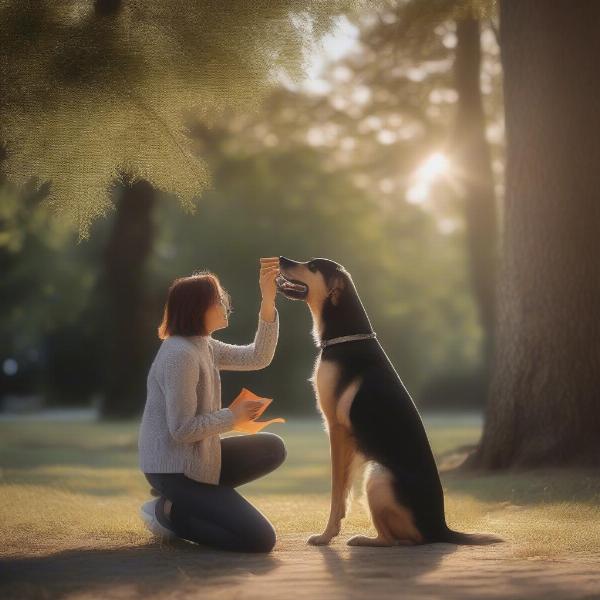Dogs on trees might seem like an unusual sight, but understanding why they climb and how to manage this behavior can be crucial for their safety and well-being. This guide explores the various reasons behind this behavior, from playful exploration to potential distress, and offers practical advice for dog owners.
Why Do Dogs Climb Trees?
Several factors can contribute to a dog’s tree-climbing behavior. Some breeds, particularly those with a strong prey drive or a history of hunting small animals, might be more inclined to chase squirrels or other creatures up trees. Puppies, driven by curiosity and a developing sense of coordination, might also attempt to climb. Sometimes, fear or anxiety can lead a dog to seek refuge in a tree, perceiving it as a safe haven. Additionally, some dogs simply enjoy the challenge and the elevated perspective.
Is Tree Climbing Dangerous for Dogs?
While some dogs are agile climbers, tree climbing poses inherent risks. Falls, even from relatively low heights, can result in injuries such as broken bones, sprains, or internal trauma. A dog could also become trapped in the branches, leading to panic and further injury. Therefore, it’s essential to address this behavior proactively, especially if your dog is prone to climbing.
How to Prevent Your Dog from Climbing Trees
Discouraging tree climbing involves understanding the underlying motivation and implementing appropriate training techniques. If your dog is motivated by prey, redirect their attention with toys or games whenever they show interest in climbing. Positive reinforcement, such as rewarding your dog for staying on the ground, can be highly effective. For anxious dogs, creating a safe and secure environment can help reduce their need to seek refuge.
 Dog Owner Training "Stay" Command
Dog Owner Training "Stay" Command
What to Do if Your Dog is Stuck in a Tree
If your dog becomes stuck, remain calm and try to coax them down with gentle encouragement and treats. Avoid shaking the tree or making sudden movements, which could frighten them and cause a fall. If your attempts are unsuccessful, contact your local animal control or fire department for assistance. They have the expertise and equipment to safely retrieve your dog.
Breed-Specific Considerations
Certain breeds, such as Jack Russell Terriers, are notorious for their climbing abilities. Understanding your dog’s breed-specific traits can provide valuable insights into their behavior. While discouraging climbing is generally recommended, providing safe climbing opportunities, such as agility courses or designated climbing structures, can be a suitable alternative for some dogs.
Conclusion
Addressing your dog’s tree-climbing behavior requires a combination of prevention, training, and understanding. By identifying the underlying cause and implementing appropriate strategies, you can ensure your dog’s safety and well-being while fostering a positive and enriching environment.
FAQ
-
Why does my dog like to climb trees? Dogs may climb trees for various reasons, including prey drive, curiosity, anxiety, or simply the enjoyment of climbing.
-
Is it safe for my dog to climb trees? No, tree climbing is generally not safe for dogs and can lead to falls or other injuries.
-
How can I stop my dog from climbing trees? Positive reinforcement training, redirection, and creating a safe environment can help discourage tree climbing.
-
What should I do if my dog gets stuck in a tree? Remain calm, try to coax them down, and contact animal control or the fire department if necessary.
-
Are some breeds more prone to tree climbing? Yes, some breeds, like Jack Russell Terriers, are known for their climbing tendencies.
ILM Dog is your trusted resource for expert advice on dog care, offering comprehensive information on breeds, health, training, nutrition, and more. From choosing the right breed to ensuring your dog’s lifelong well-being, we’re here to support you every step of the way. Whether you’re a seasoned dog owner or just starting your journey, we provide practical tips and insights to help you navigate the joys and challenges of dog ownership. Contact us today for personalized guidance and explore our extensive resources at ILM Dog. Email: [email protected]. Phone: +44 20-3965-8624.